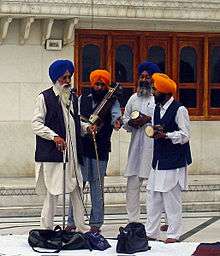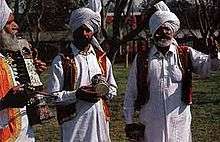Dhadi

Dhadi (Punjabi: ਢਾਡੀ, Dhādi), also spelled as Dhadhi, is one who sings ballads using Dhadd[1][2][3] and also Sarangi,[4] the folk instruments of Punjab. According to Kahn Singh Nabha's Mahan Kosh the definition of dhadhi is "One who sings ballads of warriors playing Dhadd".[1][3] Dhadis are a distinct group/singers emerged in the time of Sikh gurus.[2][4][5][6]
Meaning
The word Dhadi can be translated in English to be a minstrel or bard. The word is used several times in the Sikh religious text, Guru Granth Sahib, in the meaning of humbleness. In his compositions, Hazrat Baba Nanak called himself a Dhadhi of God.[5][6] The word is also appeared in the writing of the third, fourth and fifth Guru and Bhagat Namdev.[5]
History
As the word is used by the Sikh Gurus, it's clear that Dhadis has a history of hundred years.[5] The sixth Sikh guru, Guru Hargobind fostered and promoted the Dhadi art and transformed the tradition from singing the praises of landlords or rulers to sing the praises of the true God.[5] Dhadis were mainly emerged in the time of the sixth Sikh master Guru Hargobind who established the Sikh high court, Akal Takhat, and established Dhadhis to sing the previously composed Gurbani from Guru Granth Sahib.[6][7] Later, the contemporary Dhadis repertoire had broadened to include heroic ballads known as Vaars.[5]
In that age only the lower caste people, i.e. Mirasis, used to sing as the profession was not considered to be noble or respectable for higher classes/castes. While Mirasis were Muslims, Dhadis were not confined to a particular religious affiliation.[6] Guru Hargobind Sahib fostered the Dhadis and refined their repertoire.[2][4][8] Along with singing Gurbani, their songs came to deal with the tales of heroism and valour and was used to entertain as well as to fill the army with warrior's spirit.[2][6] Two Dhadis of that age, Bhai Natha and Bhai Abdulla,[5][8][9] are still remembered with respect. Bhai Abdulla was a gifted poet and used to sing his own compositions in the Guru's court.[2][6]
Dhadi Jatha

Dhadi Jatha (Jatha means 'a team' or a group) is a team of Dhadis which usually consists of three or four Dhadis; one Sarangi master/player, two dhadd players and one telling the story by a lecture.[5] The singers sing one by one or together like chorus according to the lyrics.
The Dhadis today are the integral part of Sikh and Punjabi music.[6] The tradition has broadened its repertoire, including religious compositions, heroic ballads, folklores, folk love stories, history, romance and other types of folk songs.[5][6] Normally, the Jathas are known by the leader's name; for example, Dhadi Jatha of Nirmal Singh Noor.
See also
References
| Wikimedia Commons has media related to Dhadi. |
- 1 2 Nabha, Kahn Singh (1930). Gur Shabad Ratnakar Mahan Kosh (first ed.). Amritsar: Bhai Chatar Singh, Jeewan Singh (later ed.).
- 1 2 3 4 5 Hardial Thuhi (2008). Punjabi Lok Dhadi Kala. Unistar Books Pvt. Ltd. ISBN 9788171424849.
- 1 2 "'Dhadhis' add zing to poll campaign". News in English. Bassi Pathana. The Tribune. January 5, 2012. Retrieved July 22, 2012.
- 1 2 3 Michael Nijhawan (2006). Dhadi Darbar. United Kingdom: Oxford University Press. p. 286. ISBN 9780195679670.
- 1 2 3 4 5 6 7 8 9 "Importance of Dhadi tradition". www.esikhs.com. Retrieved 14 Mar 2012.
- 1 2 3 4 5 6 7 8 "DHADHIS". www.sikh-heritage.co.uk. Retrieved 13 Mar 2012.
- ↑ "DHAD". www.chandrakantha.com. Retrieved 13 Mar 2012.
- 1 2 Bhaura, Ashok (1991). Panjab De Dhadi. Original from the University of California. p. 80.
- ↑ "About Giani Sant Singh Paras". www.gianisantsinghparas.com. Retrieved March 16, 2012.